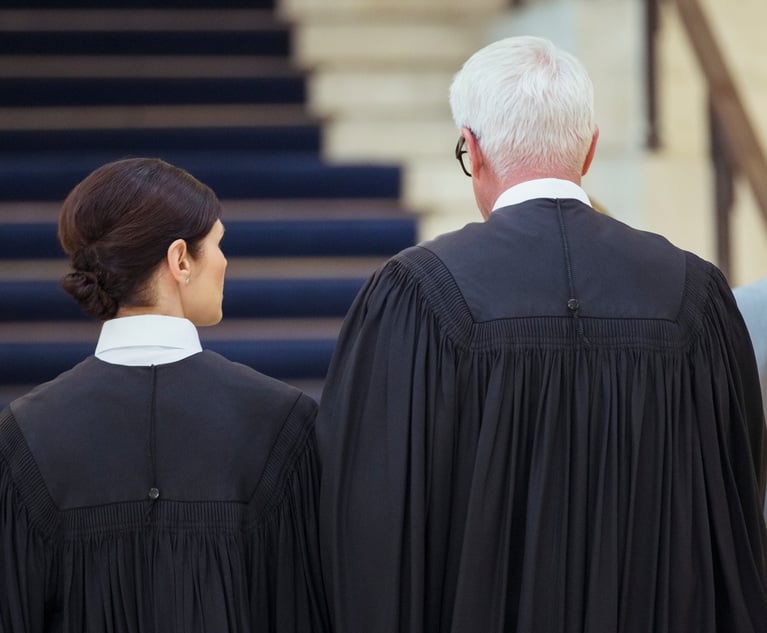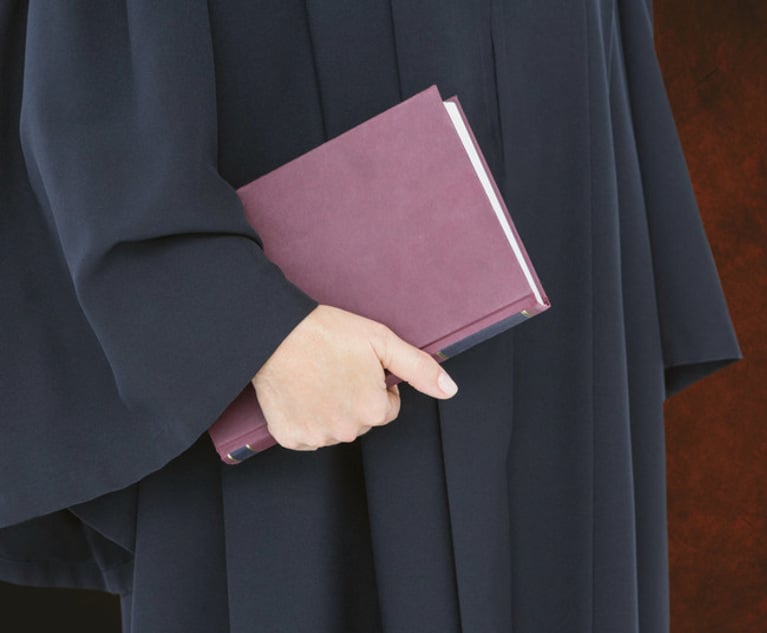Home Depot Case on Class Actions Joins U.S. High Court Docket
The case has implications for corporations of all sizes and their legal departments, which could be facing class action-sized headaches if Home Depot falters.
September 27, 2018 at 05:18 PM
4 minute read
The original version of this story was published on Corporate Counsel

The U.S. Supreme Court has given appellate attorneys for Home Depot reason to invoke the national big box store's slogan, “Let's Do This.”
The Supreme Court agreed Thursday to hear Home Depot USA v. Jackson, which hinges on the U,S, Court of Appeals for the Fourth Circuit' interpretation of the Class Action Fairness Act. CAFA allows defendants to remove actions from the state to federal court if certain jurisdictional requirements are met.
The case has implications for corporations of all sizes and their legal departments, which could be facing class action-sized headaches if Atlanta-based Home Depot falters.
Home Depot argued that third-party counter-defendants should be entitled to remove the claims against them to federal court under CAFA. Home Depot is such a defendant in the case at hand, which began when Citibank filed a debt collection action against George Jackson in a North Carolina state court. Jackson filed counterclaims against Home Depot and another business.
In urging the Supreme Court to hear the case, Home Depot and its attorneys asserted that the Fourth Circuit's “countertextual interpretation of CAFA's removal provision has created a roadmap for circumventing CAFA's goal of ensuring that defendants in qualifying class actions may defend themselves in federal court.”
Home Depot has amici backing from the Retail Litigation Center Inc., U.S. Chamber of Commerce, Product Liability Advisory Council Inc. and DRI, an organization of defense attorneys and in-house counsel.
DRI asserted in its brief that the Supreme Court needed to step in and “prevent forum-shopping plaintiffs lawyers from evading CAFA removal and forcing national defendants to litigate or settle class action claims in plaintiff-friendly state courts.”
In urging the Supreme Court not to hear the case, Jackson contended in his brief that Home Depot's argument was “exaggerated and unconvincing,” adding that the company and the amici “should take their complaint to Congress.”
“That Congress has done nothing in the years since the judicial consensus on this issue emerged underscores that Home Depot's assertion that the courts of appeals have flouted congressional intent is incorrect,” Jackson said.
Jackson's counsel of record, Brian Warwick of Varnell & Warwick in Lady Lake, Florida, wrote in an email that Home Depot and its supporters were using the case as a “vehicle to achieve a broader and illegitimate end—to upend the intent of Congress and Supreme Court precedent and force all class action litigation into federal court, even for small classes only involving local issues.”
Home Depot's attorney, Sarah Harrington of Goldstein & Russell in Bethesda, Maryland, declined an interview request.
Another case to watch:
The Supreme Court also added to its docket Rimini Street v. Oracle USA, which pits two software companies against one another in a big money fight that centers on a circuit split over cost-shifting in copyright cases.
Rimini Street Inc., which is facing more than $20 million in costs and is accused of $35.6 million in copyright infringement damages, argued this case is a “pristine vehicle to resolve a circuit split over whether the Copyright Act authorizes courts to award nontaxable costs.”
Oracle didn't want the case to get this far. It had contended in opposition to cert that the case is the “poster child for why Congress gave courts 'discretion' to award prevailing parties in copyright cases their 'full costs.'”
This content has been archived. It is available through our partners, LexisNexis® and Bloomberg Law.
To view this content, please continue to their sites.
Not a Lexis Subscriber?
Subscribe Now
Not a Bloomberg Law Subscriber?
Subscribe Now
NOT FOR REPRINT
© 2025 ALM Global, LLC, All Rights Reserved. Request academic re-use from www.copyright.com. All other uses, submit a request to [email protected]. For more information visit Asset & Logo Licensing.
You Might Like
View All
Spalding Jurors Return $12M Verdict Against State Farm Insurance Client
10 minute read

Trending Stories
- 1'It's Not Going to Be Pretty': PayPal, Capital One Face Novel Class Actions Over 'Poaching' Commissions Owed Influencers
- 211th Circuit Rejects Trump's Emergency Request as DOJ Prepares to Release Special Counsel's Final Report
- 3Supreme Court Takes Up Challenge to ACA Task Force
- 4'Tragedy of Unspeakable Proportions:' Could Edison, DWP, Face Lawsuits Over LA Wildfires?
- 5Meta Pulls Plug on DEI Programs
Who Got The Work
Michael G. Bongiorno, Andrew Scott Dulberg and Elizabeth E. Driscoll from Wilmer Cutler Pickering Hale and Dorr have stepped in to represent Symbotic Inc., an A.I.-enabled technology platform that focuses on increasing supply chain efficiency, and other defendants in a pending shareholder derivative lawsuit. The case, filed Oct. 2 in Massachusetts District Court by the Brown Law Firm on behalf of Stephen Austen, accuses certain officers and directors of misleading investors in regard to Symbotic's potential for margin growth by failing to disclose that the company was not equipped to timely deploy its systems or manage expenses through project delays. The case, assigned to U.S. District Judge Nathaniel M. Gorton, is 1:24-cv-12522, Austen v. Cohen et al.
Who Got The Work
Edmund Polubinski and Marie Killmond of Davis Polk & Wardwell have entered appearances for data platform software development company MongoDB and other defendants in a pending shareholder derivative lawsuit. The action, filed Oct. 7 in New York Southern District Court by the Brown Law Firm, accuses the company's directors and/or officers of falsely expressing confidence in the company’s restructuring of its sales incentive plan and downplaying the severity of decreases in its upfront commitments. The case is 1:24-cv-07594, Roy v. Ittycheria et al.
Who Got The Work
Amy O. Bruchs and Kurt F. Ellison of Michael Best & Friedrich have entered appearances for Epic Systems Corp. in a pending employment discrimination lawsuit. The suit was filed Sept. 7 in Wisconsin Western District Court by Levine Eisberner LLC and Siri & Glimstad on behalf of a project manager who claims that he was wrongfully terminated after applying for a religious exemption to the defendant's COVID-19 vaccine mandate. The case, assigned to U.S. Magistrate Judge Anita Marie Boor, is 3:24-cv-00630, Secker, Nathan v. Epic Systems Corporation.
Who Got The Work
David X. Sullivan, Thomas J. Finn and Gregory A. Hall from McCarter & English have entered appearances for Sunrun Installation Services in a pending civil rights lawsuit. The complaint was filed Sept. 4 in Connecticut District Court by attorney Robert M. Berke on behalf of former employee George Edward Steins, who was arrested and charged with employing an unregistered home improvement salesperson. The complaint alleges that had Sunrun informed the Connecticut Department of Consumer Protection that the plaintiff's employment had ended in 2017 and that he no longer held Sunrun's home improvement contractor license, he would not have been hit with charges, which were dismissed in May 2024. The case, assigned to U.S. District Judge Jeffrey A. Meyer, is 3:24-cv-01423, Steins v. Sunrun, Inc. et al.
Who Got The Work
Greenberg Traurig shareholder Joshua L. Raskin has entered an appearance for boohoo.com UK Ltd. in a pending patent infringement lawsuit. The suit, filed Sept. 3 in Texas Eastern District Court by Rozier Hardt McDonough on behalf of Alto Dynamics, asserts five patents related to an online shopping platform. The case, assigned to U.S. District Judge Rodney Gilstrap, is 2:24-cv-00719, Alto Dynamics, LLC v. boohoo.com UK Limited.
Featured Firms
Law Offices of Gary Martin Hays & Associates, P.C.
(470) 294-1674
Law Offices of Mark E. Salomone
(857) 444-6468
Smith & Hassler
(713) 739-1250







